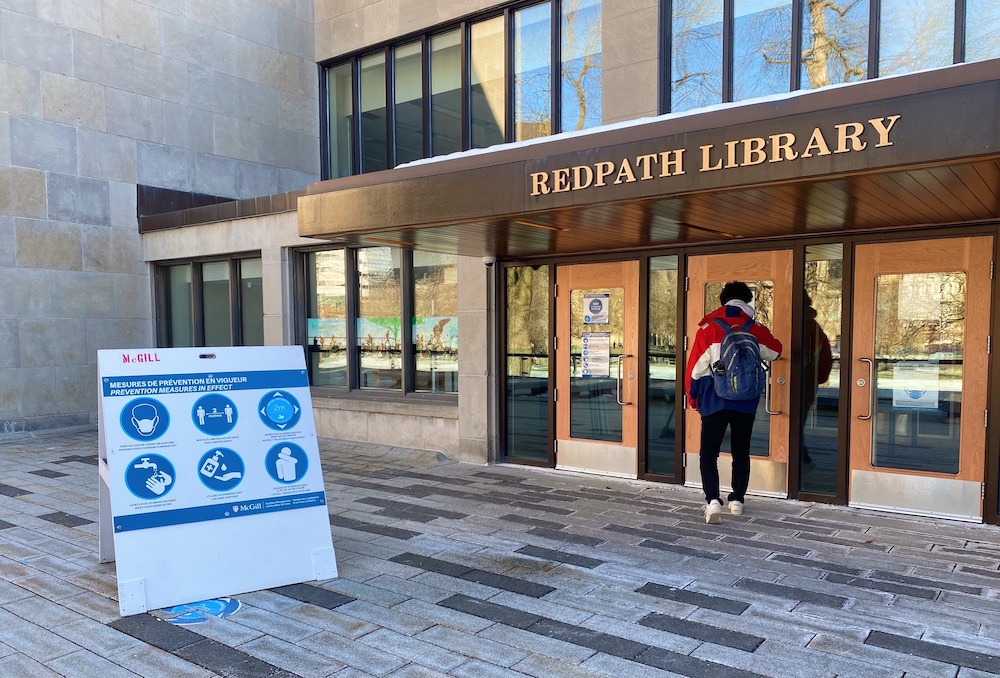The McGill Tribune Opinion section staff writers debate the merits of the synchronous versus asynchronous learning styles adopted during the pandemic.
Michael Dickinson: Synchronous
COVID-19 has upended students’ university experiences, and without a normal routine, it is hard to stay motivated. Many students also feel socially isolated and miss the sense of community that in-person classes provided. Although they are an imperfect substitute, synchronous online courses are better than asynchronous alternatives because they replicate the structure and social engagement of in-person learning.
The comfort of an established routine is critical for mental health, and synchronous classes allow structure during a time of constant uncertainty. While it is easy to put off watching lecture recordings, students are less likely to procrastinate when material is delivered at a set time. When students plan their days around lectures, it creates a sense of purpose and motivation that online classes otherwise lack.
Live courses also grant students the opportunity to actively participate, developing a community atmosphere that cannot be found elsewhere in online education. In a synchronous format, students can ask professors questions in real time and discuss class concepts with their peers. While online conversations may be awkward at times, they are invaluable to students suffering from social isolation since they are the only way to foster the spontaneous interactions that make learning worthwhile and enjoyable.
Although live classes can present accessibility concerns for certain students, professors can adapt elements of their courses to give students a choice that they would not have in fully asynchronous classes. For example, McGill strongly encourages professors to record live lectures for students who cannot attend. Implementing select asynchronous elements within the synchronous format meets a variety of student needs.
Lecture recordings may be the better option for some, but there is no reason why they should be forced on all students. Even during a pandemic, the university experience should be more meaningful than watching videos, and synchronous virtual classes remain the best alternative to learning in person.
Valentina de la Borbolla: Asynchronous
McGill encourages a combination of synchronous and asynchronous elements, for good reason. While in some ways valuable, the synchronous aspects of university classes remain constraining and unrealistic considering COVID-19 and how the pandemic has upended our lives.
Synchronous Zoom meetings where attendance is graded and only a handful of students participate do very little for student’s education and well-being. Although similar in format to recorded lectures, Zoom meetings do not allow for regular breaks and rewinding, which are both crucial to accommodate students’ attention spans, note-taking, and Zoom fatigue. In a Fall 2020 McGill survey, 79 per cent of respondents identified difficulty focussing as a challenge of online classes and 59 per cent of respondents struggled with time management. On the other hand, 64 per cent of respondents believe that pre-recorded lectures are serving them well.
An asynchronous approach to online schooling gives students the option to work at their own pace. In a time where choice is bound by public safety, there is value in dictating your own schedule. Flexibility is key to living through a pandemic, and universities should give their students the time and resources to overcome the challenges of online schooling.
Although this much agency can lead to a lack of structure, the synchronous model is not much better. It is unreasonable to expect students––many of whom are currently in time zones different from Montreal––to bear the constraints of mandatory attendance and graded participation when these are not the most beneficial methods for online learning. Students living in different time zones should not have to choose between having enough sleep and receiving an education. The online format does not foster in-depth conversations, making it difficult to hold effective class discussions. Forcing interactions does not lead to active engagement, it only induces anxiety.
McGill should give up the notion that online school is equivalent to in-person learning and focus on reducing students’ misery. The only feasible system is one that allows students to adapt their class schedules to their mental health and other responsibilities, rather than imposing a structure that leaves them drained and frustrated.









